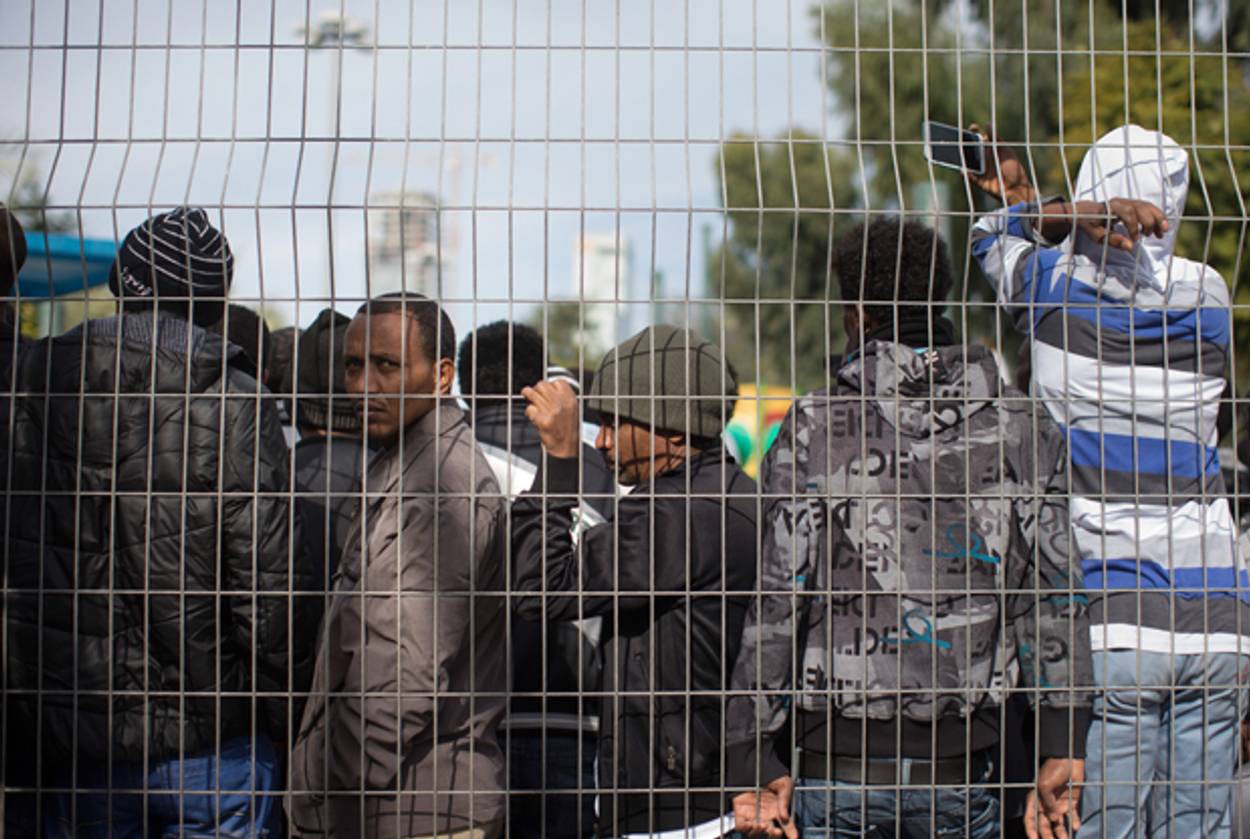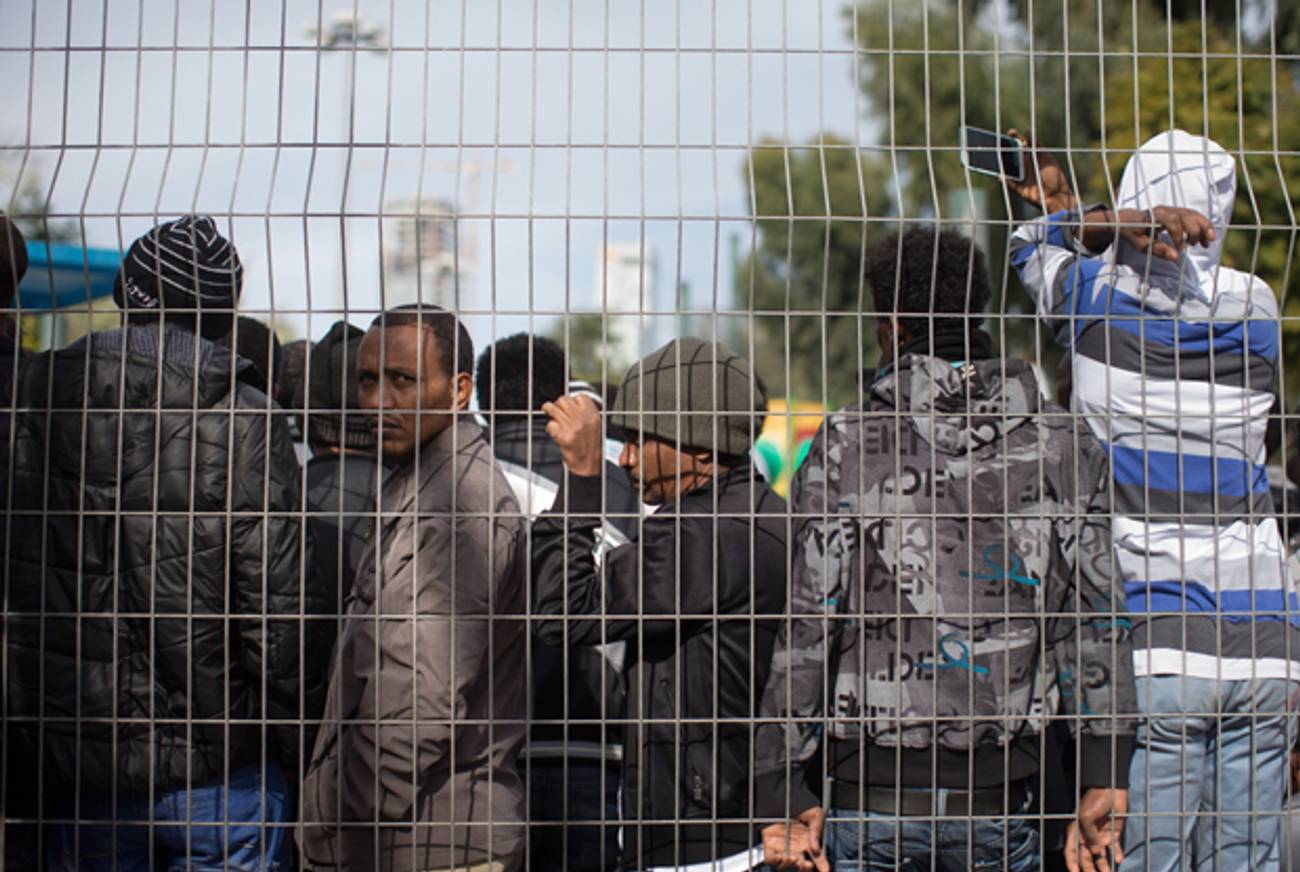African Migrant Protest Continues for Fourth Day
Thousands gather in Tel Aviv to demonstrate against new detention policy




African migrants in Israel continue to protest for a fourth day in Tel Aviv’s Rabin Square in an ongoing strike that began Sunday with 20,000 protestors. A hunger strike enters its fourth day. The protestors, representing Israel’s estimated 55,000 African migrants, are protesting their treatment by Israel’s Ministry of the Interior, whose policies don’t recognize migrants from Eritrea and Sudan as refugees—instead designating them “infiltrators”—which has led to the detention of nearly 2,500 refugees in the Saharonim and Ketziot internment camps.
That number is about to increase, the result of a new detention policy and the establishment of an “open” internment facility at which African migrants will have to check in three times a day. The protests also coincide with increased arrests among this population, who are required to renew their visas every one to three months.
“We are demanding that Israeli authorities release refugees from the internment centers, and take our individual cases as refugees and treat us as human beings,” says Mutasim Ali, a refugee from Darfur and Director of the African Refugee Development Center in Tel Aviv.
After a Supreme Court ruling in September deemed the three-year mandatory incarceration of Sudanese and Eritrean refugees in these camps to be in violation of Israeli human rights law, the Ministry of the Interior delayed releasing the incarcerated migrants, while passing new legislation which swapped three-year internment in closed internment facilities to indefinite internment in open internment facilities, says Tally Amir, professor of law at the College of Law and Business in B’nei Brak. “The focus of the protest is the violation of the refugee convention with the mass detention in Saharonim and in the open facility.”
Israel has so far refused to recognize the migrants as refugees, in part because when it comes to U.N. refugee treaties, Israel has only the obligation of non-refoulment—of not returning people to the place where they face a well-founded fear of persecution—explains David Abraham, a professor of law at University of Miami School of Law who specializes in immigration and citizenship law. This means that Israel has no pathway to citizenship for refugees. Contrast this to the United States, which agreed to accept between 50,000 and 200,000 refugees each year and to provide them with a path to citizenship within a year.
“Israeli sentiment seems to me divided between those who emphasize Israel as a mature prosperous democracy with an obligation to show a bit of rachmanus towards the most desperate people in the world,” says Abraham, “and those on the other side who make it their business to worry about the threat to the Jewish nature of the state. There are those who fear that this would mean taking a step towards Israel becoming a state of all its citizens, rather than a Jewish state.”
But the threat of an African mass migration is largely imagined, explains B’nei Brak’s Amir, due to a wall built between Israel and Egypt which has been extremely effective at keeping asylum seekers out of the Jewish homeland. “Last year, 36 people came into Israel. That’s not a threat in any way,” Amir says. And Israel has as yet failed to claim that they pose a security threat—those incarcerated are so without having stood trial.
“What are you going to do with people if you don’t recognize their presence as legal?” Abraham adds, “You try to extinguish it by making their temporary presence as uncomfortable as possible.” The internment camps have been explicitly linked by the Ministry of Interior with “voluntary repatriation.”
The African Refugee Development Center’s Ali explained that the more than 50,000 refugees are required to renew their visas every month, but only four offices in the country are open to them, and only for a few hours twice a week. “It’s a humiliation. I do what I can, but … It’s an inhuman way to treat a human being. At the end of the day, we’re human beings, you know what I mean?”
The protest was organized by refugees from within Jerusalem’s open detention facility when a protest on December 16 failed to effect a change in policy, Ali said.
“We have a legal and moral commitment to refugees, to these people who are already inside Israel, and they can be valuable to society and not just a burden. Instead of spending a fortune on their detention, these resources should go towards their assimilation,” said Amir.
“The issue, of course, is that Israel has no provision for non-Jewish immigration and it has a difficult enough time recognizing the citizenship of Arabs born within the boundaries of the state,” Abraham explained. “There are those who believe that if they begin to accept refugees from the Sudan, what about all those Palestinians who can claim family roots in Israel who are sitting in Lebanon.”
The Ministry of Interior didn’t respond to requests for comment.
Batya Ungar-Sargon is a freelance writer who lives in New York. Her Twitter feed is @bungarsargon.